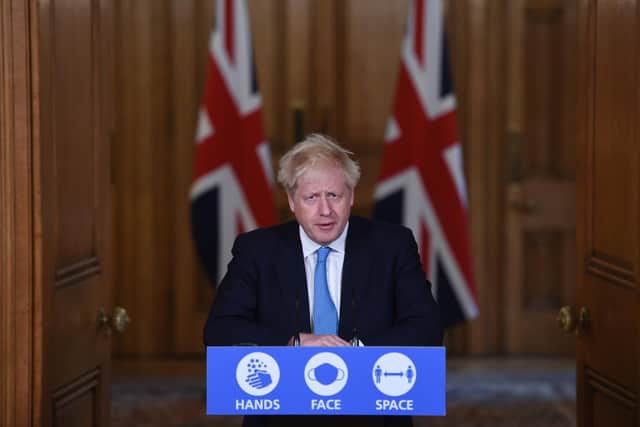Life in lockdown: Boris Johnson's six minute speech which gripped the nation
Britain was going into lockdown in the hope that an almost complete halt to everyday life and work would slow the spread of what was then still being called coronavirus.
As Boris Johnson spoke to the nation from 10 Downing Street on Monday March 23 2020, 335 people in Britain had died of the virus against which there was no vaccine. Hospitals were running out of intensive care beds, and the daily tally of new cases increased relentlessly.
Advertisement
Hide AdAdvertisement
Hide AdIn the days before his broadcast, modelling by London’s Imperial College had concluded that without radical action, 500,000 could die and the NHS would be completely overwhelmed. That shocking and stark prediction was the trigger for lockdown.


A sombre Mr Johnson spoke for just over six minutes, saying: “Without a huge national effort to halt the growth of this virus, there will come a moment when no health service in the world could possibly cope; because there won’t be enough ventilators, enough intensive care beds, enough doctors and nurses.
“And as we have seen elsewhere, in other countries that also have fantastic health care systems, that is the moment of real danger.
“To put it simply, if too many people become seriously unwell at one time, the NHS will be unable to handle it - meaning more people are likely to die, not just from coronavirus but from other illnesses as well.”
Advertisement
Hide AdAdvertisement
Hide AdThen came the order that had never before been issued, even when Britain was at war: “From this evening I must give the British people a very simple instruction - you must stay at home.”
Britain fell quiet. Only essential shops – principally selling food – remained open and roads were empty. Business districts were deserted. People were allowed out for one period of exercise a day and police patrolled to stop transgressors, issuing fines to those who broke the rules.
The Chancellor, Richmond MP Rishi Sunak, only five weeks into the job, faced an unprecedented challenge – how to safeguard the jobs of millions as the economy ground to a halt. There would be £330bn of loan guarantees to support businesses and a furlough scheme to pay 80 per cent of employees’ wages while they were unable to work.
Growing anxiety that nobody was safe from the virus deepened two days after the lockdown broadcast when it was announced Prince Charles had it. The following day, Mr Johnson tested positive.
Advertisement
Hide AdAdvertisement
Hide AdThe gravity of the national emergency was underlined on Sunday April 5 when Queen Elizabeth broadcast to the nation for only the fifth time on an occasion other than Christmas in her 68-year reign.
Almost 24m watched as the Queen – quarantined at Windsor with Prince Philip - delivered a message of reassurance.
“We should take comfort that while we may have more still to endure, better days will return: we will be with our friends again; we will be with our families again; we will meet again.”
As the Queen spoke, Mr Johnson was admitted to hospital. The next day, he was moved into intensive care.
Advertisement
Hide AdAdvertisement
Hide AdHow dangerously ill he had been became plain when, haggard and weak, he was discharged on April 12. He said: “I have today left hospital after a week in which the NHS has saved my life, no question. It’s hard to find the words to express my debt.”
Gradually, after weeks of worry and isolation for many, the outlook began to improve. Shops started reopening in June, and pubs followed in July. But it was far from over. Autumn brought a new surge in cases, and Britain was destined for a second lockdown in November.
But as the year closed, there came new hope. Britain became the first western country to licence a vaccine against what had been named Covid-19, with those most at risk prioritised.
At 6.31am on December 8, in Coventry, 90-year-old Margaret Keenan became the first person in Britain to receive the jab, inaugurating a historic mass vaccination programme.
Advertisement
Hide AdAdvertisement
Hide AdYet the journey to that moment had been heartbreaking, with families unable to say goodbye to loved ones and health services stretched to breaking point.
Four years to the day after a moment in Britain’s history that nobody will ever forget, the Government’s own statistics tell a tragic story.
A year after Mr Johnson spoke, more than 10,000 people in Yorkshire had died from Covid. By the time the pandemic was past, they were among Britain’s 227,000 lost.
Comment Guidelines
National World encourages reader discussion on our stories. User feedback, insights and back-and-forth exchanges add a rich layer of context to reporting. Please review our Community Guidelines before commenting.